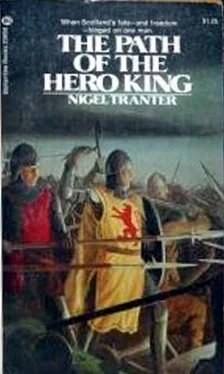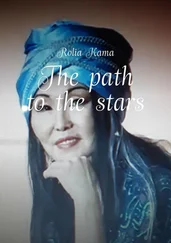The hall-house, however un defendable in itself, was infinitely more
commodious and comfortable than any castle. Christina was obviously
used to dispensing hospitality in a large way, and found room for
Bruces people with seeming ease. The King was given a large room
which, he suspected, was the ladys own, and had certainly no
complaints to make. If any of the Lowlanders had had a notion that
they would have to endure semi-barbarous conditions, they were speedily disillusioned. The feast that followed, considering the speed with which it had been conjured up, was on a scale and of a quality worthy of any great nobles establishment in the south, and the wines better than most could offer. Fully a score of Gannoran chieftains sat down with the visitors, in a sort of court-although Christina herself was the only woman present-their wolfhounds making up for their lack of womenfolk. But the behaviour of these was civil and orderly-indeed more so than many a hallful of belted knights and lords. If most were loud in their assertions as to what they would have done had they known of their ladys danger at the hands of the dastardly Rossmen, that was only natural.
Taking their time from her, they were all notably respectful towards the Lowland King, for Highlandmen.
Only the entertainment which accompanied the meal was somewhat strange to the visitors. Instead of minstrels, tumblers, clowning dwarfs or even dancing bears and the like, here were men, not all ancient by any means, who told endless stories about fabulous heroes and quite unbelievable deeds, interspersed with lengthy genealogies which seemed to be an integral part of the performanceand which were listened to, surprisingly, with evidently rapt attention. Since all this, however, was in the Erse, or Gaelic, which few of the newcomers understood-the Bruces did, since they had had a Celtic motherand since it was not the southern custom to pay any close heed to mere background entertainment during a banquet, the Kings people by and large tended to talk through it all-which clearly did not commend itself to their hosts, though there were no overt reproaches. Bruce, on Christinas right, grew uncomfortable; but his brother Edward, on her other side, was not affected, himself being fairly completely preoccupied by the ladys charms-and making it very clear. Edward was ever interested in the opposite sex.
Christina MacRuarie, who looked quite capable of telling guests at her table, or anybody else for that matter, to be quiet if she so desired, did not do so. She appeared to listen to Edward with OAP ear, while at the same time she did not neglect the King on her right, keeping his platters and goblets filled-yet managing also to seem to attend to the storytellers.
But presently, with a venerable, white-bearded seannachie bowing himself out, to unaccountable applause, and the youngest tale-teller of all stepping forward from halfway down the great table to take his place, the atmosphere began to change. Even Edward Bruce sat forward to watch and listen.
For this young man, although he had his head bandaged and one arm hung limply at his side, was an orator of a different order. Full of energy and fire, his words came out in rushes and spurts and flourishes, with dramatic pauses, and gesturings of his sound arm-and although the words themselves were still in the Gaelic, something of their import and urgency reached even to those who could not understand them.
Bruce listened keenly, especially when he heard his own name coming into it all-not as a king but as a renowned warrior travelled from a far country. The oration was in fact an extempore, vivid and highly styli sed and elaborated version of the afternoons galley-fight, with everything dramatised and turned into heroics, all noblest valour, fairest beauty, blackest treachery and haunting romance-a sort of instant saga. Thus, evidently, were the famed Celtic epics born. Bruce perceived that he was very much this ones hero, as his hostess was the noble heroine whom he had come so far to rescue. Somewhat embarrassing as this might be, he was not blind to-the advantages it might have for his cause in these latitudes, amongst people at once so warlike, extravagant and histrionic as these.
All but exhausted, the young man finished on a telling note of the victorious Robert of Alba, the noble blood of his wounds being staunched by the beauteous Christina of the Isles, who then conducted him and his noble band to her ancestral halls amongst the fairest prospects of all the Hebrides. He was summoned to the head of the table to receive his ladys congratulations and thanks amidst the plaudits of all. Bruce did some swift thinking. The orator was introduced to him as Ranald MacRuarie of Smearisary, son of Christinas natural half-brother Roderick. He had, in fact, though young, been captain of the attacked birl inn He was, therefore, of some consequence in the Gannoran polity. The King stood up.
That sword? he said, pointing to a huge two-handed brand which hung on the wall near by, beneath a tattered banner.
Whose is it?
That is the sword of my ancestor, Somerled the King, Christina told him.
So much the better, he said.
I crave your permission?
Assuming the said permission, he strode over and took the weapon down. Returning, he raised it high-with difficulty, on account of its weight and the stiffness of his now bandaged arm.
Come, friend, he said to the young man.
I, Robert of Scotland, salute you. In your words and in your deeds.
He brought down the great blade, more heavily than he intended, on one
of the somewhat alarmed orators shoulders. He should have tapped the
other shoulder also, but feared in his stiffness that he was mote likely to strike the already bandaged head in between, and contented himself, letting the weighty weapon sink to the floor.
I dub thee knight. Be thou a good and true knight until thy lifes end.
Stand, Sir Ranald MacRuarie MacDonald!
There was a few moments of silence, and then exclamation and outcry from all over the hall. There was wonder, acclaim and criticism in it the last from some of his own people, his brother in eluded, shocked at this debasement of knighthood on little better than a young savage.
Bruce was not perturbed by the note of disapprobation, especially when it was so clearly over born by the acclaim and even glee. He himself had no doubts that his impulse had been a sound one. He had, with a single stroke of a sword-and Somerleds sword at that-not only made a notable impression on these people and given a unique impetus to a new-forming legend which might well prove extremely useful to his cause, but had established the fact of his kingship and royal prerogative before them all, doing something that no other could or would do. Moreover he had established a precedent, made a Highlander a knight-and if this was accepted, as it looked like being, it implied also the acceptance, here at least, of his suzerainty.
If the young man himself seemed quite dumbfounded, Christina at least was obviously delighted. She actually clapped her hands.
A King indeed? she cried.
Here is a royal chivalry, honour. I thank you, Sire-on my heart I do!
This young man is your substitute and deputy, lady, he returned, bowing.
Might knighthood be bestowed on a woman, on your fair shoulders would fall this blade. In salutation.
Your Grace is kind-and I am grateful. But perhaps there may be … other salute? More meet for a woman! And she met his eye frankly.
Bruce inclined his head, but found this a good moment to make a display of handing over the sword to the new knight. They seated themselves again, and the banquet continued.
It was already late and Bruce, smothering yawns, was debating how he might, without offence to his hostess-who certainly gave no impression of weariness-intimate that his couch called, when an elderly man whom he had seen before, frail and stooping, came to whisper in Christinas ear. She raised her brows, and turned to the King.
Читать дальше












